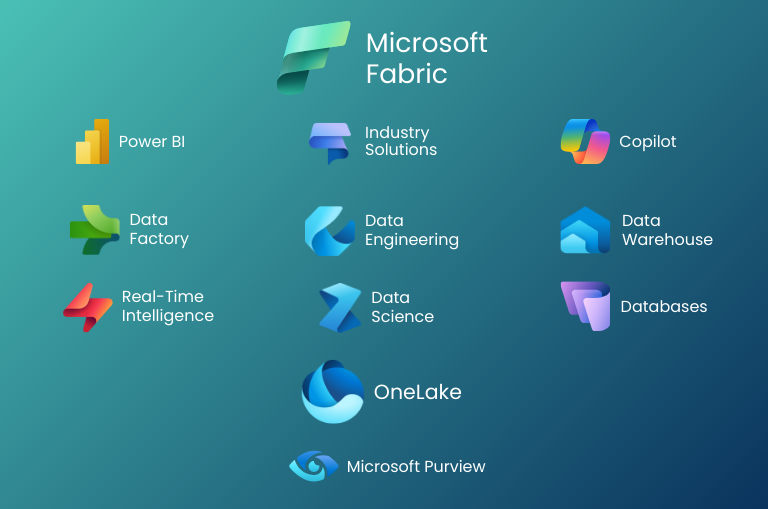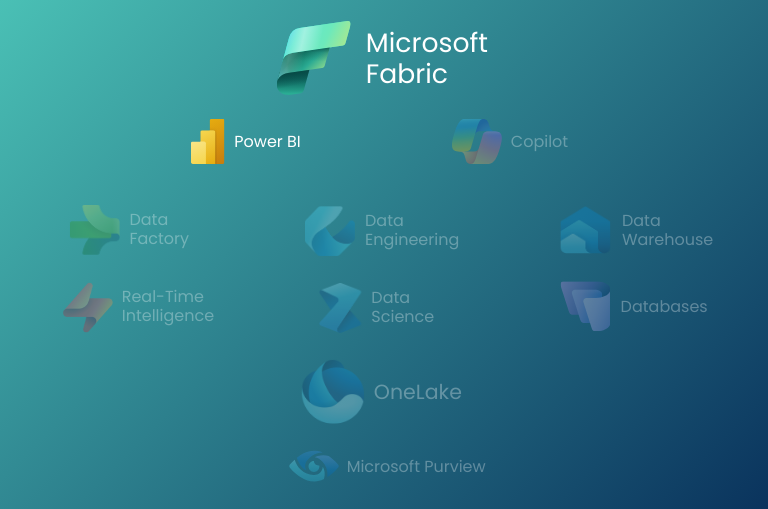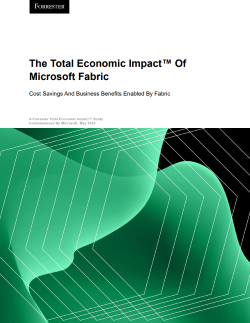What is Power BI in Microsoft Fabric
Is your company fully leveraging the potential hidden in data to outpace the competition in the digital age?
AI-driven transformation is no longer the future but the present, where the combination of data, people, and technology is revolutionising the very foundations of business. Organisations that can effectively manage information and make decisions based on solid data gain a significant advantage.
Microsoft Fabric and Power BI provide a comprehensive analytics platform, integrating various services in one place, making it easier to use AI in everyday business operations. With such tools, companies can not only collect and process data but also generate and easily create valuable analyses that drive innovation and increase competitiveness in the market.
What is Microsoft Fabric?
Microsoft Fabric is a comprehensive, integrated data and analytics platform designed for enterprises seeking a simple yet versatile solution for collecting, processing, and analysing information. The platform operates in a SaaS (Software as a Service) model, ensuring ease of use, high scalability, and security.
The core premise of the platform is to unify resources and services in one consistent environment. Instead of integrating solutions from different providers, Microsoft Fabric offers a unified technology stack based on Microsoft Azure cloud, streamlining work for both business teams and IT specialists.
Data in Microsoft Fabric is stored in OneLake — a central repository, eliminating the need to use multiple, often scattered, data storage solutions. This allows companies to manage access more efficiently, maintain data consistency, and ensure regulatory compliance.
Built-in artificial intelligence (AI) mechanisms help better understand data and use it within Microsoft Azure AI Services and specific applications — from real-time reporting to advanced machine learning modelling available in Microsoft Azure AI Foundry.
One of the most innovative elements of the platform is Microsoft 365 Copilot, an integral part of Fabric. Copilot is a generative AI (GenAI)-powered assistant that automates routine tasks, fills gaps in specialised knowledge, and suggests optimal operations on data. As a result, users can quickly create reports, formulate queries, and implement data engineering processes without writing complex scripts.
Moreover, Copilot analyses the context of data and adjusts suggestions to specific business needs. Consequently, organisations using Microsoft Fabric, supported by Microsoft Copilot, gain an integrated environment for efficiently connecting data from diverse sources, such as Microsoft Dynamics 365 Sales, designing advanced analytics pipelines, and leveraging machine learning algorithms, as well as ready-made large (LLM) and small (SLM) models in daily work.
This cohesive platform significantly reduces administrative costs, accelerates the deployment of new projects in Power Platform and Microsoft Copilot Studio, and effectively supports teams at all levels in maximising the potential of information.
What applications are included in Microsoft Fabric?
Microsoft Fabric is a suite of services with broad applications across the entire data processing and analytics cycle. It offers a unified platform where each component plays a key role in the ecosystem.

As a result, companies gain versatile tools for data migration, management, and analysis, as well as for creating innovative AI solutions.
- Fabric Data Factory - This is a modern tool for integrating and preparing data from various sources. It allows the automation of ETL/ELT processes, task scheduling, and fast transfer of even gigantic volumes of information to target data warehouses. In addition to a rich library of connectors, Data Factory provides mechanisms functional in AI transformation, such as built-in support for intelligent data flows. Thanks to its simple interface, both experienced programmers and business specialists can quickly create data pipelines without the need to write complicated scripts.
- Fabric Data Engineering - A module created for teams specialising in advanced calculations and data engineering. It offers a Spark cluster-based environment, enabling fast processing of massive datasets and integration with other Fabric components. This fosters the creation of scalable machine learning projects, supported by configurable tools and libraries.
- Fabric Data Warehouse - A high-performance data warehouse designed with scalability and flexibility in mind. It allows the separation of computing resources from storage, enabling users to manage performance and costs independently. It supports the native Delta Lake format and integrates seamlessly with other services.
- Fabric Databases - Facilitate the management of relational and custom data structures in a centralised environment. They allow quick replication of data from various sources and consistent scaling for transactional and analytical applications.
- Fabric Data Science - A module that simplifies the design, training, and deployment of machine learning models. It supports integration with Azure Machine Learning and provides a set of tools that facilitate experiments and model lifecycle management.
- Fabric Real-time Intelligence - Provides instant collection and processing of streaming data, enabling real-time event monitoring and log analysis. This allows companies to respond quickly to dynamically changing business conditions based on current data.
- Fabric Power BI - A well-known and valued tool for visualisation and interactive data analysis. In the Fabric environment, it provides easy access to all resources in OneLake, speeding up the creation of reports and dashboards.
- Copilot in Fabric - Copilot is an AI assistant that supports users in automating tasks related to data transformation, cleaning, and modelling. Its ability to generate suggestions and code significantly accelerates the implementation of new analytical processes and learning how to use the platform.
- Fabric OneLake - A central data repository where all files and tables are collected. Thanks to consistent storage, information can be easily shared across different Fabric modules, and data duplication can be avoided.
- Microsoft Purview - A comprehensive solution for data governance and security. It allows monitoring the flow of information within Fabric and establishing governance and compliance policies.
- Fabric Industry Solutions - Provides dedicated industry-specific data solutions that form a solid foundation for data management, analysis, and key decision-making. These solutions address the specific challenges of different sectors, enabling companies to optimise processes, combine data from many sources, and use advanced analytical tools.
Microsoft Fabric combines all these areas into a unified data platform, offering the most comprehensive environment for analysing large datasets in the entire industry. Fabric enables organisations and individuals to transform large and complex data repositories into practical, working solutions and business analyses.
The future of cloud-based Business Intelligence (BI)
Cloud BI systems play an increasingly important role in data analysis, enabling organisations to make quick and accurate decisions. By integrating with unified data platforms, cloud BI provides access to massive amounts of real-time information, offering scalability, flexibility, and advanced analytics.
- Real-time analytics — The growing demand for real-time data processing allows companies to monitor performance indicators and customer behaviour instantly.
- AI integration — Artificial intelligence supports the automation of analytics processes, such as report generation and trend prediction.
- Data democratisation — BI is becoming more accessible to employees without advanced technical knowledge thanks to intuitive interfaces and self-service tools.
- Cloud solutions — Migration to the cloud enables global team collaboration and reduces infrastructure costs.
- The cloud BI market will reach USD 116.25 billion by 2033, growing at a CAGR of 9% (Straits Research).
- 85% of enterprises will adopt a “cloud-first” strategy by the end of 2025, accelerating the adoption of cloud BI tools (Visma).
- 50% of companies will use AI-powered BI tools for real-time decision-making by 2027 (Sigmoid Analytics).
- 70% of leaders plan to unify analytical data in central lakehouse-based repositories (Edvantis).
- Cloud BI solutions reduce operational costs by 30–50% compared to traditional on-premises systems (arXiv).
The future of cloud BI lies in AI integration, real-time analytics, and democratising data access. Companies investing in these technologies gain a competitive edge through better collaboration, faster decision-making, and lower operating costs.
What is Fabric Power BI?
Fabric Power BI is an advanced analytics tool within Microsoft Fabric that enables the creation of interactive reports and data visualisations. It is an ideal solution for companies seeking to transform raw data into clear and helpful information. Power BI integrates with various data sources, both on-premises and in the cloud, ensuring flexibility and scalability.

One of Power BI’s key features is its use of artificial intelligence. With built-in AI functions, users can automatically generate forecasts, analyse trends, and identify anomalies in data without advanced technical expertise. Power BI also offers Microsoft Copilot, which assists in report creation through intelligent suggestions and automatic visualisation generation based on input data.
Additionally, Power BI in Microsoft Fabric supports teamwork through integration with other tools in the Microsoft ecosystem, such as OneLake. This central data repository ensures easy access to information for all users while maintaining security and compliance with company policies.
Power BI also provides advanced analytics features, such as drill-down, enabling an in-depth understanding of data at various levels of detail. Users can create custom dashboards tailored to specific business needs, allowing better decision-making based on current data.
Who is Fabric Power BI for?
Fabric Power BI is designed for a wide range of users, from data analysts to business managers.
Thanks to its intuitive interface, the tool is ideal for both experienced analytics professionals and those just starting their journey in data analysis.
Companies of various sizes and industries can use Power BI to understand their data better, optimise processes, and support innovation.
How to use Fabric Power BI in business?
To fully leverage the capabilities of Fabric Power BI, consider the following strategies:
- Centralise data — Gather all data in OneLake for easy access and consistency.
- Automate reports — Use Copilot to create and update reports automatically.
- Personalise dashboards — Build tailored dashboards for different company departments.
- Integrate with AI — Use AI features to generate forecasts and analyse trends.
- Enable team collaboration — Allow employees to work together on data and reports in real time.
What are the benefits of using Fabric Power BI?
Using Fabric Power BI offers many benefits, such as:
- Faster decision-making — Thanks to quick access to current data and intuitive reports.
- Better data visibility — Centralised data makes management and analysis easier.
- Increased efficiency — Automating analytics processes saves time and resources.
- Support for innovation — Advanced analyses and forecasts help identify new business opportunities.
- Data security — Consistent management of security policies and data access.
What are the benefits of using Fabric Power BI in a company’s AI transformation?
The use of Fabric Power BI in a company’s AI transformation offers numerous advantages:
- Automation of analyses — Applying AI to generate reports and automatically study
- Better predictions — Using AI algorithms to produce more accurate business forecasts.
- Personalised experiences — Customising reports and dashboards to individual user needs.
- Increased innovation — Using AI to discover new patterns and trends in data.
- Process optimisation — Automating routine analytics tasks, improving operational efficiency.
How does Power BI integrate with other Microsoft Fabric modules?
Power BI is deeply integrated with other Microsoft Fabric modules, enabling smooth transitions between different platform functionalities. Power BI uses OneLake as the central data repository, providing a single source of truth for all analyses and reports.
Thanks to integration with Data Factory, users can easily import and process data from various sources, streamlining data preparation for further analysis. Moreover, Power BI works with Fabric Data Engineering and Fabric Data Science, allowing advanced data processing and machine learning model building directly within the platform.
Integration with Copilot allows AI to automate report and visualisation creation, increasing analysts’ efficiency. Through integration with Real-time Intelligence, Power BI enables real-time data analysis, crucial for fast business decision-making.
Collaboration with Fabric Data Warehouse ensures high performance and scalability, allowing storage and analysis of large data volumes.
Return on investment from implementing the unified Microsoft Fabric data platform

The Forrester report The Total Economic Impact™ Of Microsoft Fabric (TEI) shows that Microsoft Fabric delivers 379% return on investment (ROI) over three years with 9.79 million USD NPV. Analysing a company with revenues of 5 billion USD, Fabric increased data engineer productivity by 25% (1.8 million USD savings), increased business analyst efficiency by 20% (4.8 million USD savings) and generated 3.6 million USD in profits through better decisions.
Infrastructure savings reached 779 thousand USD, and employee retention improved by 8%. The unified platform integrates data engineering, storage, science, and real-time analytics, eliminating silos. The SaaS model and intuitive interface enable data availability across the organisation, supporting data-driven strategies, according to the Forrester TEI study commissioned by Microsoft.
Summary
Power BI in Microsoft Fabric is an invaluable tool for companies seeking an integrated AI transformation. Thanks to advanced analytics features, seamless integration with other Microsoft Fabric modules, and AI powered by Microsoft Copilot, Power BI enables the transformation of raw data into valuable insights.
Implementing Microsoft Fabric together with Microsoft Power BI creates a powerful analytics platform, integrating data from various sources and enabling advanced visualisation. Implementing Microsoft 365 Copilot further streamlines work, offering intelligent assistance in data analysis and report creation directly in familiar applications. IT training in Power BI for employees will increase their competencies, allowing them to explore data and draw conclusions independently. This synergistic approach will boost efficiency, improve data-driven decision-making, and strengthen innovation in the company.
Organisations can better manage their data, optimise business processes, and support innovation, ultimately leading to increased market competitiveness. Regardless of company size or industry, Fabric Power BI offers the tools needed for effective data-driven decision-making, which is crucial in today’s dynamic business environment.

